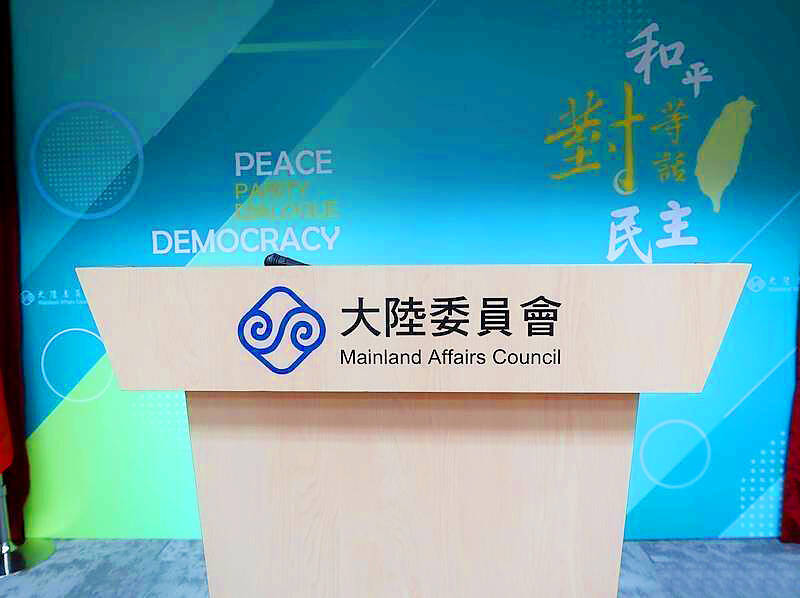China’s “Anti-Secession” Law has no binding force over Taiwanese, Mainland Affairs Council (MAC) Minister Chiu Chui-cheng (邱垂正) reiterated yesterday, as Beijing marked the legislation’s 20th anniversary.
Chinese Minister of Foreign Affairs Wang Yi (王毅) attended the event at the Great Hall of the People in Beijing, but Chinese President Xi Jinping (習近平) was conspicuously absent, despite expectations that he would take part in the symbolic event.
Speaking at the event, National People’s Congress Standing Committee Chairman Zhao Leji (趙樂際) said that under Xi’s leadership, the Chinese Communist Party’s Central Committee has comprehensively implemented his “thought” on resolving the “Taiwan question.”

Photo: Chung Li-hua, Taipei Times
China must maintain its dominance and initiative over cross-strait relations, as it conducts efforts to “unify” the nation against Taiwanese pro-independence forces, he said.
The “Anti-Secession” Law’s main objectives include deterring and countering Taiwanese separatists to promote unification under the guidance of “Xi Thought” and the rule of law, he said.
China’s Taiwan Affairs Office Director Song Tao (宋濤) said that the “Taiwan question” is an internal matter that would brook no interference from foreign forces.
The “Anti-Secession” Law aims to maintain national sovereignty and territorial integrity by utilizing countermeasures and deterrence, he said, adding that the legislation draws a “clear red line” setting conditions for “the use of non-peaceful means to counter the actions of pro-Taiwanese independence forces.”
In Taipei, Chiu said the “Anti-Secession” Law is part of Beijing’s efforts to wage lawfare against Taiwan.
The Chinese law has no power over Taiwanese or the Republic of China’s sovereignty, he said.
Beijing’s actions only serve to alienate Taiwanese, increase mutual hostilities and obstruct diplomacy across the Strait, he said.
The Mainland Affairs Council will steadfastly defend the nation’s sovereignty, democracy, prosperity, peace and stability, standing in solidarity with all Taiwanese against Beijing’s ambitions to annex Taiwan, he said.
Taiwanese are resolute in resisting annexation, which will only make the nation stronger, he added.
Former Chinese Nationalist Party (KMT) mainland affairs director Huang Ching-hsien (黃清賢) claimed to represent his “Taiwanese compatriots” in speaking at the event.
Taiwanese compatriots could obtain perks for achieving their dreams and bringing glory to China’s magnificent tradition only by acknowledging that they are part of the Chinese family, said Huang, who teaches at Nankai University’s Zhou Enlai School of Government.
The “Anti-Secession” Law is a legal and peaceful method to accomplish the “unification of the motherland” to the mutual interests of peoples from both sides of the Strait, he added.
In response, the MAC said Huang might represent some KMT members, but he does not represent Taiwan.
The KMT declined to comment yesterday.
China’s National People’s Congress on March 14, 2005, passed the “Anti-Secession” Law, giving legal license to check so-called “secessionist” forces in Taiwan through “non-peaceful means or other necessary measures.”

Intelligence agents have recorded 510,000 instances of “controversial information” being spread online by the Chinese Communist Party (CCP) so far this year, the National Security Bureau (NSB) said in a report yesterday, as it warned of artificial intelligence (AI) being employed to generate destabilizing misinformation. The bureau submitted a written report to the Legislative Yuan in preparation for National Security Bureau Director-General Tsai Ming-yen’s (蔡明彥) appearance before the Foreign Affairs and National Defense Committee today. The CCP has been using cognitive warfare to divide Taiwanese society by commenting on controversial issues such as Taiwan Semiconductor Manufacturing Co’s (TSMC, 台積電) investments in the

HELPING HAND: The steering committee of the National Stabilization Fund is expected to hold a meeting to discuss how and when to utilize the fund to help buffer the sell-off The TAIEX plunged 2,065.87 points, or 9.7 percent, to close at 19,232.35 yesterday, the highest single-day percentage loss on record, as investors braced for US President Donald Trump’s tariffs after an extended holiday weekend. Amid the pessimistic atmosphere, 945 listed companies led by large-cap stocks — including Taiwan Semiconductor Manufacturing Co (TSMC, 台積電), Hon Hai Precision Industry Co (鴻海精密) and Largan Precision Co (大立光) — fell by the daily maximum of 10 percent at the close, Taiwan Stock Exchange data showed. The number of listed companies ending limit-down set a new record, the exchange said. The TAIEX plunged by daily maxiumu in just

‘COMPREHENSIVE PLAN’: Lin Chia-lung said that the government was ready to talk about a variety of issues, including investment in and purchases from the US The National Stabilization Fund (NSF) yesterday announced that it would step in to staunch stock market losses for the ninth time in the nation’s history. An NSF board meeting, originally scheduled for Monday next week, was moved to yesterday after stocks plummeted in the wake of US President Donald Trump’s announcement of 32 percent tariffs on Taiwan on Wednesday last week. Board members voted to support the stock market with the NT$500 billion (US$15.15 billion) fund, with injections of funds to begin as soon as today. The NSF in 2000 injected NT$120 billion to stabilize stocks, the most ever. The lowest amount it

INVESTIGATION: The case is the latest instance of a DPP figure being implicated in an espionage network accused of allegedly leaking information to Chinese intelligence Democratic Progressive Party (DPP) member Ho Jen-chieh (何仁傑) was detained and held incommunicado yesterday on suspicion of spying for China during his tenure as assistant to then-minister of foreign affairs Joseph Wu (吳釗燮). The Taipei District Prosecutors’ Office said Ho was implicated during its investigation into alleged spying activities by former Presidential Office consultant Wu Shang-yu (吳尚雨). Prosecutors said there is reason to believe Ho breached the National Security Act (國家安全法) by leaking classified Ministry of Foreign Affairs information to Chinese intelligence. Following interrogation, prosecutors petitioned the Taipei District Court to detain Ho, citing concerns over potential collusion or tampering of evidence. The